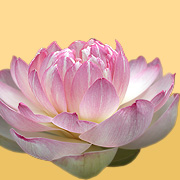


Sayadaw U Kundalabhivamsa was born on monday, the 6th of june 1921. He is the second son of U Tha Phyo and Daw Pu To of Winkadat Village in Waw Township in Pegu division. He was initiated into the Order of the Buddhist Clergy as a novice at the age of ten. At 20, he received higher ordainment as a monk under the tutelage of the Kangi Monastery in Pho San Pai Village.
In 1953, Sayadaw U Kundalabhivamsa passed all the nine subjects in the Governement held Sasanadhaja Sripavara Dhammacariya examination. He passed the Cediyingana examination in 1955.
He served as a lecturer at the Kyaukkon Tawya Medini Monastery from 1954 to 1976. He taught batch by batch of student monks who were appearing for the Patamagyi and the Dhammacariya examinations. He also fulfilled his other ecclesiastical obligations there as a patron monk. For health reasons, he had to take a two year's rest from his lecturing responsibilities. He served as a senior lecturer for twenty years at Medini.
Sayadaw U Kundalabhivamsa went to Mahasi Sasana Yeiktha in 1976 and there he practised Vipassana Meditation for two years as a yogi. He taught the technique there as a senior Teacher or Nayaka Kammathanacariya for two years.
With the permission of the Venerable Mahasi Sayadaw, he moved to Saddhammaramsi Monastery on the 8th of july 1979 and established the Saddhammaramsi Vipassana Meditation Centre. Beginning 1979, he has been imparting Vipassana- meditation techniques to both clergy and laity. So far (june 1998), 13669 yogis have practised Vipassana meditation under his guidance.
Whilst teaching Vipassana at this center, he has written many treatises on Vipassana meditation and religious matters. Some notable editions are:
More than 40 books in Burmese out of which 26 have already been translated into English.
For such performances, the Government has offered MahaKammatthanacariya title in 1994 and AggaMahaKammatthanacariya title in 1997.